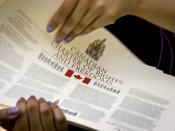Absolute prohibition against assisted-suicides is a violation of the Canadian Charter of Rights and Freedoms. The prohibition infringes on the right to security of person (which protects the dignity and privacy of individuals with respect to decisions concerning their own body) and the right to equal treatment under the law, "preventing persons physically unable to end their lives without assistance from choosing an option that is available to other members of society." (http://web.apc.org/dwd/canlaw.html) In order to create provisions for the Canadian Charter of Rights and Freedoms that will deal with this issue, one must examine approaches that have already been taken within our country and in others. The Constitution grants Canadians the right to life, but it has yet to be determined where our rights to death lie.
In Canada there are no laws that directly address the issue of euthanasia or doctor-assisted suicides. There is, however, section 241 of the Criminal Code, which states,
Everyone who
a) councils a person to commit suicide, or
b) aids or abets a person to commit suicide whether suicide ensues or not, is guilty of an indictable offence and liable to imprisonment for a term not exceeding 14 years.
Section 241 of the Criminal Code is meant to protect those who are more inclined to take the advice of another to take their own life. These situations often arise because of temporary states of depression, or perhaps because of a traumatic experience in their lives. In these peoples cases it is likely that their suffering is impermanent and that they will go on to lead happy and healthy lives. Section 241 is also used as a deterrent against someone who has "a strong malicious or selfish reason to bring about the death of another." (http://www.web.apc.org/dwd/canlaw.html,) In the case of such offenders one...


